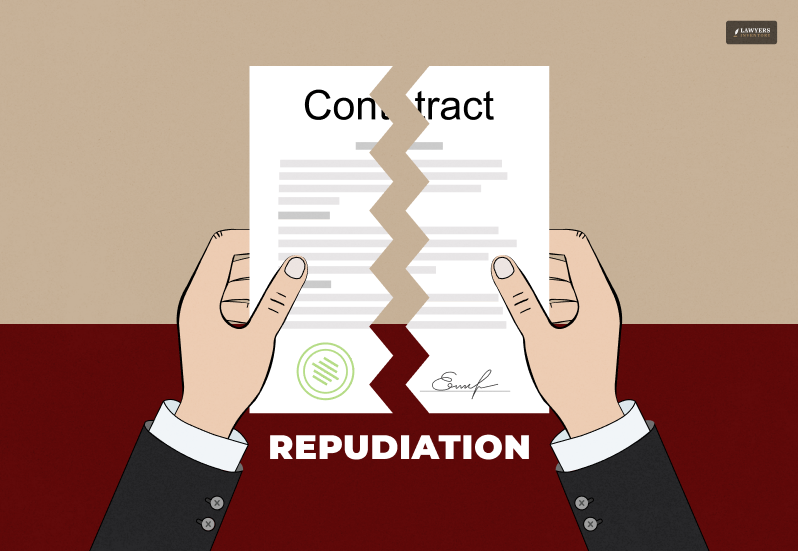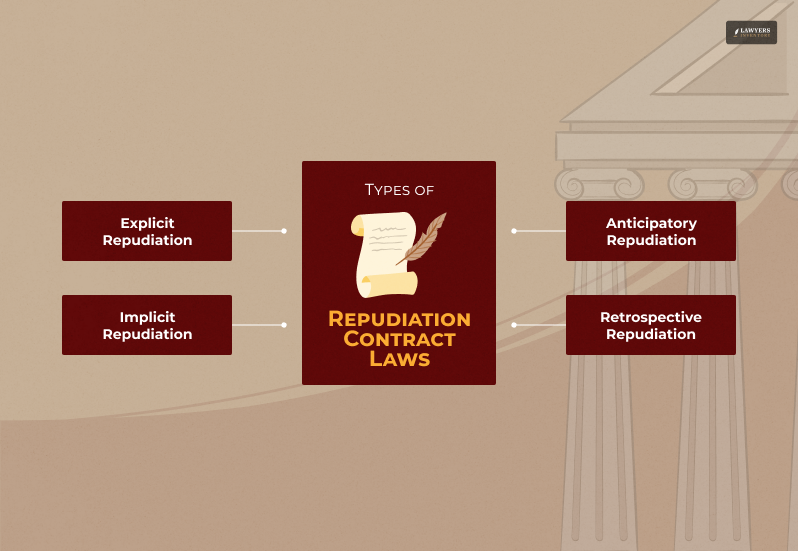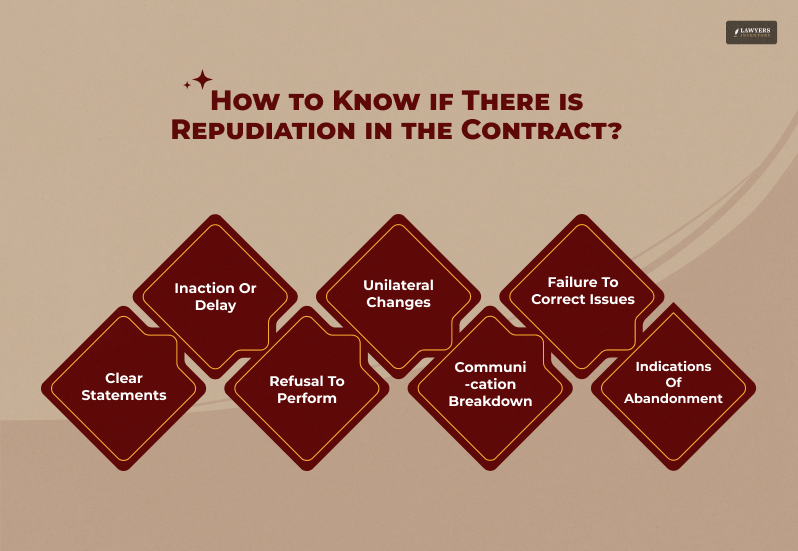
When we enter into a contract, we expect both parties to hold up their end of the bargain. But what happens when one side refuses to fulfill their obligations? That’s where Repudiation comes in – a fancy legal term that means “reneging on a deal.”
Repudiation contract law is essential, especially if you’re new to contracts. It’s about what happens when one party rejects or refuses to perform their contractual duties.
For instance, think of it like a broken promise. If someone backs out of a deal without a valid reason, the other party might feel frustrated and unsure of what to do next. That’s where contract laws come in – to provide a framework for resolving these disputes.
In this beginner’s guide, I will break down the basics of repudiation contract law so you can confidently navigate these complex situations. Therefore, keep on reading this blog till the end to learn more…
Understanding Repudiation of Contract Law
So, what is the repudiation of contract law?
When one party makes it obvious they won’t carry out their end of the bargain, that is known as repudiation under contract law. It’s equivalent to saying, “I will not fulfill my promise.”
This is regarded as a serious breach of contract and can be accomplished through words or deeds. Consider it akin to a partnership. You pledge to the other party when you sign a contract.
Repudiation can have dire repercussions since it is equivalent to breaking a commitment. The opposing party may be able to void the agreement, file a lawsuit for damages, or pursue other legal remedies.
Repudiation can happen in different ways. For example, a contractor might refuse to finish a job, or a supplier might fail to deliver goods as promised. Whatever the situation, repudiation contract law can resolve the dispute and hold the responsible party accountable.
It’s an important concept to understand, especially if entering into a contract or dealing with a broken agreement.
Types of Repudiation in Contract Laws

Contract law has several types of Repudiation, each with its nuances. Every kind of repudiation has its implications and consequences. Understanding these differences can help you navigate complex contract disputes and know your rights and options.
Let’s break them down:
1. Explicit Repudiation
Firstly, Explicit Repudiation is when one party says they won’t fulfill their contractual obligations. It’s like a straightforward “no” to the contract. This can be done through words, writing, or even email. The key is that it’s an open and apparent refusal to perform.
For example, let’s say you hire a contractor to build a deck, and they suddenly tell you, “I’m not going to finish the job.” That’s explicit Repudiation. Or, if a supplier emails you saying, “We’re not delivering the goods as promised,” that’s also explicit Repudiation.
In both cases, the party clearly states they won’t meet their contractual obligations, leaving no room for doubt or misinterpretation. This repudiation gives the other party an apparent reason to take action and protect their interests.
2. Implicit Repudiation
Second, when someone makes it evident through their acts or behavior that they will not honor their end of the bargain, that is known as implicit repudiation. In case of this, either of the parties seems to be yelling, “I’m not doing it!” inaudibly.
Consider it analogous to a relationship in which someone is clearly checking out even though they don’t say so. They might not be making an effort, be unreliable, or arrive late most of the time.
This conduct in a contract may even go so far as to say outright, “I’m not going to do it.” It suggests that they have no intention of carrying out their end of the bargain, and the other party might have to take action to defend themselves.
3. Anticipatory Repudiation
When one party gives notice that they will not carry out their end of the bargain before the performance is due, this is known as anticipatory repudiation. They seem to declare, “I’m not going to do it,” before they are required to.
Let’s take an example where you hire a contractor to build a deck, and two weeks before the deadline, they inform you that they will not be able to finish the job on time.
Alternatively, a provider can declare, “We’re not going to be able to deliver the goods as promised.” Due to their indication that they won’t fulfill their responsibilities by the deadline, this is anticipatory repudiation.
By indicating to the other party that the contract won’t be fulfilled, this repudiation enables them to take early action, like locating a substitute supplier or contractor. It functions as an alert that the agreement will be broken.
4. Retrospective Repudiation
Lastly, Retrospective Repudiation is when one party refuses to fulfill their contractual obligations after the fact. They say, “I’m not going to finish what I started,” or “I’m not going to fix my mistakes.”
For example, let’s say a contractor builds a deck, but it needs to be better done and meet the agreed-upon standards. If the contractor refuses to fix the issues or complete the work, that’s retrospective repudiation. Or, a supplier delivers faulty goods and refuses to replace them or provide a refund.
In both cases, the party repudiates the contract after starting or completing their part. This repudiation can be damaging because it leaves the other party with an incomplete or faulty outcome, and they may need legal action to resolve the issue.
How to Know if there is Repudiation in the Contract?

Just like any other breach of contract law, you can figure out Repudiation. If you notice any of these signs, it may indicate Repudiation.
When assessing repudiation, it’s essential to consider the concept of unconscionability contract law, which refers to a contract or clause deemed unfair or oppressive. If a contract is unconscionable, it may be voided or revised, and repudiation may be deemed valid.
Understanding contract law clauses and unconscionability contract law can help you navigate complex contract disputes and recognize repudiation.
Here are some signs that may indicate repudiation in a contract:
- Clear statements: One party says they won’t fulfill or meet their obligations.
- Inaction or delay: One party consistently needs to catch up on deadlines, ignores requests, or fails to perform their duties.
- Refusal to perform: One party must do what they promised in the contract.
- Unilateral changes: One party changes the contract terms significantly without the other party’s agreement.
- Communication breakdown: One party stops responding or communicating with the other party.
- Failure to correct issues: One party knows about problems or defects but doesn’t fix them.
- Indications of abandonment: One party shows no intention of continuing their obligations or commitments.
What Should be Done if a Contract is Repudiation?

If a contract is repudiated, don’t panic! Repudiation doesn’t have to be the end of the road. It’s a bump, but with the proper guidance, you can navigate it and find a resolution that works for you.
Take a deep breath and follow these steps:
- First, assess the situation. Understand what’s happening and what the repudiation means for you. Consider what the other party has said or done, and gather evidence.
- Secondly, communicate with the other party. Try to talk to them and understand their perspective. There may be a misunderstanding or a way to resolve the issue amicably.
- Thirdly, if that doesn’t work, seek legal advice. Talk to a lawyer who can guide you on your rights and options. They can help you understand if the repudiation is valid and what you can do to protect yourself.
- Finally, take action. Depending on the situation, you might need to cancel the contract, negotiate a new agreement, or take legal action. Your lawyer can help you decide the best course of action.
How Does the Court Prove Repudiation of Contract Law?

Proving Repudiation of a contract in court involves showing evidence that one party clearly indicated they wouldn’t fulfill their obligations.
Proving Repudiation requires clear evidence and a strong argument. A lawyer can help navigate the process and build a solid case. Here’s how it typically works:
- First, the party claiming repudiation (the plaintiff) presents their case, sharing evidence like emails, letters, witness statements, and documentation of missed deadlines or failed deliveries.
- Next, the plaintiff must show that the other party’s (the defendant’s) actions or words were unequivocal, meaning they clearly indicated they wouldn’t meet their commitments.
- The plaintiff may call witnesses, like experts or people who saw or heard the defendant’s repudiatory behavior.
- The defendant may argue that they didn’t intend to repudiate the contract or that circumstances changed, making it impossible to fulfill obligations.
- The judge or jury weighs the evidence, considering factors like the contract terms, communication between parties, and mitigating circumstances.
- If the plaintiff proves Repudiation, the court may grant remedies like contract cancellation, damages, or specific performance (forcing the defendant to fulfill their obligations).
Wrapping it Up!
I hope that this blog has been of help to you. If you have any other questions related to this, please feel free to let me know.
All you need to do is scroll down until you reach the page’s bottom. Then, leave your comments in the box below. And I will be there to answer them all for you!
You May Like Also:
- What Are the Elements of a Contract?
- Financial Criminal Lawyer: I Bet You Didn’t Know THIS!
- Wrongful Death Attorney: What They Do and Why You MUST Know About Them!











0 Reply
No comments yet.